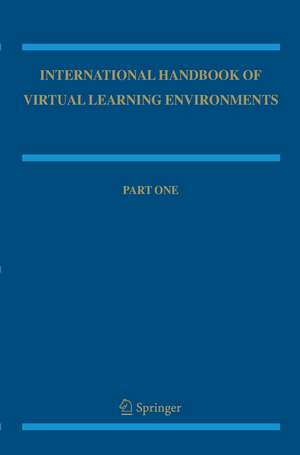International Handbook of Virtual Learning Environments: Springer International Handbooks of Education, cartea 14
Editat de Joel Weiss, Jason Nolan, Jeremy Hunsinger, Peter Trifonasen Limba Engleză Hardback – 21 apr 2006
The Handbook is divided into four sections: Foundations of Virtual Learning Environments; Schooling, Professional Learning and Knowledge Management; Out-of-School Learning Environments; and Challenges for Virtual Learning Environments. A variety of chapters representing different academic and professional fields are included. These chapters cover topics ranging from philosophical perspectives, historical, sociological, political and educational analyses, case studies from practical and research settings, as well as several provocative 'classics' originally published in other settings.
| Toate formatele și edițiile | Preț | Express |
|---|---|---|
| Paperback (1) | 2655.03 lei 38-44 zile | |
| SPRINGER NETHERLANDS – 23 aug 2016 | 2655.03 lei 38-44 zile | |
| Hardback (1) | 2697.99 lei 38-44 zile | |
| SPRINGER NETHERLANDS – 21 apr 2006 | 2697.99 lei 38-44 zile |
Din seria Springer International Handbooks of Education
- 18%
 Preț: 2566.01 lei
Preț: 2566.01 lei - 20%
 Preț: 2524.84 lei
Preț: 2524.84 lei - 18%
 Preț: 2495.78 lei
Preț: 2495.78 lei - 18%
 Preț: 2787.65 lei
Preț: 2787.65 lei - 18%
 Preț: 2509.03 lei
Preț: 2509.03 lei - 18%
 Preț: 2528.13 lei
Preț: 2528.13 lei - 24%
 Preț: 3424.55 lei
Preț: 3424.55 lei - 18%
 Preț: 2557.33 lei
Preț: 2557.33 lei - 18%
 Preț: 4736.83 lei
Preț: 4736.83 lei - 18%
 Preț: 2500.50 lei
Preț: 2500.50 lei - 20%
 Preț: 3447.61 lei
Preț: 3447.61 lei - 18%
 Preț: 2562.04 lei
Preț: 2562.04 lei - 18%
 Preț: 1917.28 lei
Preț: 1917.28 lei - 18%
 Preț: 3868.23 lei
Preț: 3868.23 lei - 18%
 Preț: 3082.96 lei
Preț: 3082.96 lei - 18%
 Preț: 3078.36 lei
Preț: 3078.36 lei - 18%
 Preț: 5535.82 lei
Preț: 5535.82 lei - 18%
 Preț: 4707.16 lei
Preț: 4707.16 lei - 18%
 Preț: 5517.65 lei
Preț: 5517.65 lei - 18%
 Preț: 3071.11 lei
Preț: 3071.11 lei - 18%
 Preț: 3089.10 lei
Preț: 3089.10 lei - 24%
 Preț: 2423.31 lei
Preț: 2423.31 lei - 24%
 Preț: 3706.61 lei
Preț: 3706.61 lei - 24%
 Preț: 2659.51 lei
Preț: 2659.51 lei - 24%
 Preț: 2731.09 lei
Preț: 2731.09 lei - 18%
 Preț: 4392.57 lei
Preț: 4392.57 lei - 24%
 Preț: 1695.02 lei
Preț: 1695.02 lei - 24%
 Preț: 2733.80 lei
Preț: 2733.80 lei - 24%
 Preț: 2386.89 lei
Preț: 2386.89 lei - 24%
 Preț: 1629.92 lei
Preț: 1629.92 lei - 24%
 Preț: 1863.15 lei
Preț: 1863.15 lei - 24%
 Preț: 3410.54 lei
Preț: 3410.54 lei - 24%
 Preț: 2649.85 lei
Preț: 2649.85 lei - 24%
 Preț: 2581.76 lei
Preț: 2581.76 lei - 24%
 Preț: 3592.43 lei
Preț: 3592.43 lei - 24%
 Preț: 2642.90 lei
Preț: 2642.90 lei - 24%
 Preț: 2712.42 lei
Preț: 2712.42 lei - 24%
 Preț: 4134.92 lei
Preț: 4134.92 lei - 24%
 Preț: 3656.30 lei
Preț: 3656.30 lei
Preț: 2697.99 lei
Preț vechi: 3549.99 lei
-24% Nou
Puncte Express: 4047
Preț estimativ în valută:
516.27€ • 540.38$ • 429.69£
516.27€ • 540.38$ • 429.69£
Carte tipărită la comandă
Livrare economică 26 martie-01 aprilie
Preluare comenzi: 021 569.72.76
Specificații
ISBN-13: 9781402038020
ISBN-10: 140203802X
Pagini: 1692
Ilustrații: XXXV, 1615 p. In 2 volumes, not available separately.
Dimensiuni: 155 x 235 x 95 mm
Greutate: 2.95 kg
Ediția:2006
Editura: SPRINGER NETHERLANDS
Colecția Springer
Seria Springer International Handbooks of Education
Locul publicării:Dordrecht, Netherlands
ISBN-10: 140203802X
Pagini: 1692
Ilustrații: XXXV, 1615 p. In 2 volumes, not available separately.
Dimensiuni: 155 x 235 x 95 mm
Greutate: 2.95 kg
Ediția:2006
Editura: SPRINGER NETHERLANDS
Colecția Springer
Seria Springer International Handbooks of Education
Locul publicării:Dordrecht, Netherlands
Public țintă
ResearchCuprins
Foundations of Virtual Learning Environments.- Rethinking the Virtual.- A History of E-learning: Shift Happened.- Towards Philosophy of Technology in Education: Mapping the Field.- A Cyborg Manifesto: Science, Technology, and Socialist-Feminism in the Late 20th Century.- Teaching and Transformation: Donna Haraway’s “A Manifesto for Cyborgs” and Its Influence in Computer-Supported Composition Classrooms.- The Political Economy of the Internet: Contesting Capitalism, the Spirit of Informationalism, and Virtual Learning Environments.- The Influence of ASCII on the Construction of Internet-Based Knowledge.- Interaction, Collusion, and the Human–Machine Interface.- Technological Transformation, Multiple Literacies, and the Re-visioning of Education.- Cyberpedagogy.- Re-situating Constructionism.- Schooling, Professional Learning and Knowledge Management.- Realizing the Internet’s Educational Potential.- Virtual Schools: Reflections on Key Issues.- Time, Space, and Virtuality: The Role of Virtual Learning Environments in Time and Spatial Structuring.- Motivational Perspectives on Students’ Responses to Learning in Virtual Learning Environments.- User Adaptation in Supporting Exploration Tasks in Virtual Learning Environments.- Collaborative Text-Based Virtual Learning Environments.- Designing Virtual Learning Environments for Academic Language Development.- Inclusive E-learning.- Displacing Student–Teacher Equilibrium in Virtual Learning Environments.- Rural South African Teachers “Move Home” in an Online Ecology.- Virtual Communities of Practice.- Increasing the Democratic Value of Research through Professional Virtual Learning Environments (VLEs).- Virtual Learning Environments in Higher Education “Down Under”.- Technology and Culture in OnlineEducation: Critical Reflections on a Decade of Distance Learning.- Global Perspective on Political Definitions of E-learning: Commonalities and Differences in National Educational Technology Strategy Discourses.- An Overview of Virtual Learning Environments in the Asia-Pacific: Provisos, Issues, and Tensions.- Global Online Education.- Global Virtual Organizations for Online Educator Empowerment.- An Online Journal as a Virtual Learning Environment: The Case of the Teachers College Record.- Professional Development & Knowledge Management via Virtual Spaces.- Out-Of-School Virtual Learning Environments.- Cemeteries, Oak Trees, and Black and White Cows: Newcomers’ Understandings of the Networked World.- The eLibrary and Learning.- Beyond MuseumWalls: An Exploration of the Origins and Futures of Web-Based, Museum Education Outreach.- Genealogical Education: Finding Internet-Based Educational Content for Hobbyist Genealogists.- Downtime on the Net: The Rise of Virtual Leisure Industries.- Education, Gaming, and Serious Play.- E-learning Environments for Health Care: Advantages, Risks, and Implications.- E-Democracy: Media-Liminal Space in the Era of Age Compression.- SonicMemorial.org—The Virtual Memorial as a Vehicle for Rethinking Virtual Learning Environments.- “Why don’t We Trade Places… ”: Some Issues Relevant for the Analysis of Diasporic Web Communities as Learning Spaces.- Exploring the Production of Race Through Virtual Learning Environments.- Engaging the Disney Effect: The Cultural Production of Escapism and Utopia in Media.- “A SmallWorld After All”: L. M. Montgomery’s Imagined Avonlea as Virtual Landscape.- Slash Fiction/Fanfiction.- A Critical Eye for the Queer Text: Reading and Writing Slash Fiction on (the) Line.- Challenges for VirtualLearning Environments.- Chromosoft Mirrors.- Net: Geography Fieldwork Frequently Asked Questions.- Hacktivism: The How and Why of Activism for the Digital Age.- Weblogs and Collaborative Web Publishing as Learning Spaces.- Procedural Discourse Networks:Weblogs, Self-organizations and Successive Models for Academic Peer Review.- Wikis: Collaborative Virtual Learning Environments.- Partying Like it’s 1999: On the Napsterization of Cultural Artifacts Via Peer-to-Peer Networks.- Virtual Harlem as a Collaborative Learning Environment: A Project of the University of Illinois at Chicago’s Electronic Visualization Lab.- Video-as-Data and Digital Video Manipulation Techniques for Transforming Learning Sciences Research, Education, and Other Cultural Practices.- ePresence Interactive Media and Webforum 2001: An Accidental Case Study on the Use of Webcasting as a VLE for Early Child Development.- Networked Scholarship.- Analysis of Log File Data to Understand Behavior and Learning in an Online Community.- Reconstructing the Fables:Women on the Educational Cyberfrontier.- (Inorganic) Community Design Models and the Place of (In)appropriate Technology in International Development—What if More Than “Half the World” Wants Internet Access?.- Broadband Technologies, Techno-Optimism and the “Hopeful” Citizen.- The Matrix, or, the Two Sides of Perversion.- Learning by Being: Thirty Years of Cyborg Existemology.
Textul de pe ultima copertă
What is virtual reality and how do we conceptualize, create, use, and inquire into learning settings that capture the possibilities of virtual life? The International Handbook of Virtual Learning Environments was developed to explore Virtual Learning Environments (VLE’s), and their relationships with digital, in real life and virtual worlds.
Three issues are explored and used as organizers for The Handbook. First, a distinction is made between virtual learning and learning virtually. Second, since the focus is on learning, an educational framework is developed as a means of bringing coherence to the available literature. Third, learning is defined broadly as a process of knowledge creation for transforming experience to reflect different facets of "the curriculum of life".
To reflect these issues The Handbook is divided into four sections: Foundations of Virtual Learning Environments; Schooling, Professional Learning and Knowledge Management; Out-of-School Learning Environments; and Challenges for Virtual Learning Environments. A variety of chapters representing different academic and professional fields are included. These chapters cover topics ranging from philosophical perspectives, historical, sociological, political and educational analyses, case studies from practical and research settings, as well as several provocative ‘’classics’ originally published in other settings.
Three issues are explored and used as organizers for The Handbook. First, a distinction is made between virtual learning and learning virtually. Second, since the focus is on learning, an educational framework is developed as a means of bringing coherence to the available literature. Third, learning is defined broadly as a process of knowledge creation for transforming experience to reflect different facets of "the curriculum of life".
To reflect these issues The Handbook is divided into four sections: Foundations of Virtual Learning Environments; Schooling, Professional Learning and Knowledge Management; Out-of-School Learning Environments; and Challenges for Virtual Learning Environments. A variety of chapters representing different academic and professional fields are included. These chapters cover topics ranging from philosophical perspectives, historical, sociological, political and educational analyses, case studies from practical and research settings, as well as several provocative ‘’classics’ originally published in other settings.
Caracteristici
Includes both types of VLE, digital and virtual, in order to describe the wide landscape of possibilities for discussing, conceptualizing, creating and inquiring into VLEs Approximately 60 authors from around the world are involved in the handbook, doing critical work documenting, creating, researching, teaching and living in, on or about virtual learning environments The international thrust is important: although much of the early work has been done in North America, many of the most exciting developments are happening about the globe Part of the Springer International Handbooks Education Series

